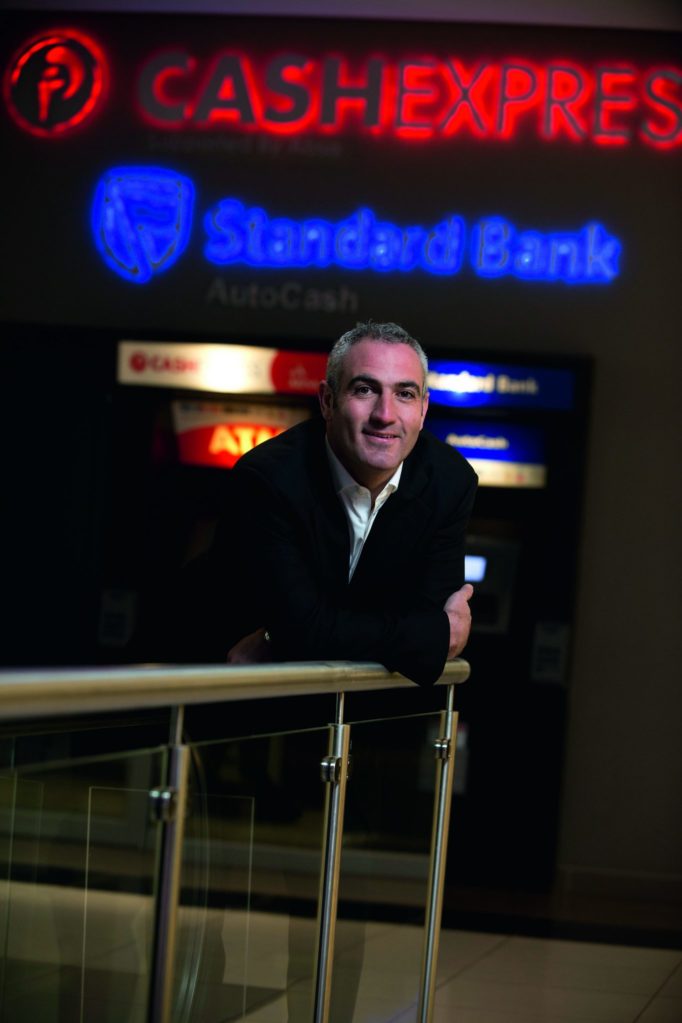It all started with an article in Forbes 14 years ago. Steven Kark was paging through the magazine when he was struck by an epiphany. The article was about three businessmen in the United States who were raking it in through the automated teller machine (ATM) industry. Couldn’t he be a millionaire too?
Kark was 25 at the time, fresh out of university, had just married and found a new job. It made more sense to stick to this steady job but the article lit an entrepreneurial flame in him that refused to go out. He wanted to know more about the industry and bring it home to South Africa.
It wasn’t a spontaneous decision, he mulled over the idea for about a year, before he took the risk. He quit his job, booked his ticket and was off to the States. He spent almost a year there, absorbing all he could about the payment services industry, meeting manufacturers and securing contracts. Kark then bought a cargo container loaded with 23 machines and headed for South Africa. When he arrived, contract in hand, he had no clue how he would pay for the cargo, or even who he would sell to.
“In South Africa banks were wholly responsible at the time for putting in ATM machines. If convenience stores like ‘Seven Eleven’ or ‘Kwik shop’ or a ‘BP Express’ wanted an ATM [they] were totally reliant on [the] bank to put in an ATM,” says Kark.
False promises from investors forced Kark to turn to family and friends. But that wasn’t the only curve ball coming his way. Their first deal with a bank went south.
Loading...
The bank in question was Saambou. The year was 2002, which saw a dramatic collapse of the bank.
Growing distrust about one of the bank’s directors led to a bank run, as rumors of the bank going under spread, it soon closed down, failing to meet the demand. It was liquidated and bought by one of South Africa’s biggest banks, First National Bank (FNB).
“That was our Black Friday actually. We had all these machines, we were really flying. All those machines were under Saambou [and] it went south. In the end we [made] a deal with Absa, they were quite ready to step into Saambou’s shoes… and today they are fantastic partners of ours,” says Kark.
Today he is the co-founder of Transaction Capital, listed in June, valued at R4.7 billion ($576 million). Transaction Capital wholly owns Kark’s three sub companies, installing ATM machines and dealing with electronic payments. Although the business is diversified, Kark treads carefully.
“We work in close collaboration with the banks today, which are expanding their footprint. If you’re going to push north outside of South Africa, you need to do it in absolute collaboration with a like-minded bank,” says Kark.
Paycorp—previously called ATM Solutions—is the subsidiary that is taking Kark north. It has more than 4,500 independent machines in South Africa and 200 in Namibia and installs at least one-a-day in shops from Cape Town to Windhoek. The fruit of 12 years of business, which has been anything but smooth.
“It was all hands on deck, I used to install the ATMs; I used to sell [them and] cash them myself. But our first time in Durban [I remember] we couldn’t offer a ‘Cash-In-Transit’ vehicle… We helped one retailer load his machine. We would go there every single morning, his wife would come out with cash hidden under her clothes and he would leave us in the back room and we would sit and load up the machine. It was unbelievable stuff, it was fascinating,” says Kark.
This industry is not for the faint-hearted. It is plagued with fraud, robberies and the infamous ATM bombings.
According to the South African Police Service Crime Report 2010/2011, there was a 61.5% increase in ATM bombings from the 2009/2010 to the 2010/2011 financial year. This after a 10.2% decrease from 2007/2008 to 2008/2009 as well 36.2% decrease from 2008/2009 to 2009/2010 financial year.
“It happens to us but certainly a lot less frequently than it ever has been. If it’s not bombings it’s something else, it’s a continuous battle where criminals will think of new and innovative ways to get their hands on your money… You need to try as best as you can to stay a step ahead,” says Kark.
One of the legacies of the ATM is that more people are using them, from cities to villages. It appears to be good for business.
“Where things are a bit geographically removed, you would find that there is a phenomenon of capital flight. If they work in town X and they live in town Y and Y doesn’t have an ATM, they would spend all their money at X. So if you put a machine where people live [they] have the ability to spend. It makes sense for everybody, there’s business for us, the community benefits, the retailer benefits and our partner banks get additional reach into those areas,” says Kark.
In fact, half of the ATMs installed in South Africa are in the villages. Little do people know, they sprang from an idea formed while paging through Forbes magazine.
Kark has framed that article, so he should, it helped make him a fortune.
Loading...
